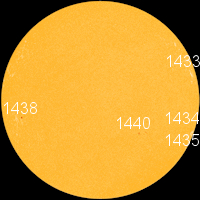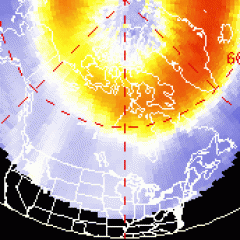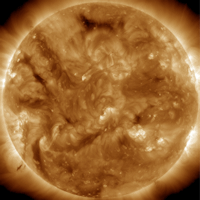MIDNIGHT ROCKET PLUMES: On Friday, March 23rd, between midnight and 3 am EDT, NASA plans a rapid-fire launch of five sounding rockets from the Wallops Flight Facility in Virginia. The rockets will deliver a chemical tracer to the upper reaches of Earth's atmosphere, forming milky white plumes that reveal high-speed winds at the edge of space. The display should be visible to the naked eye from coastal areas between South Carolina and New Jersey. [full story] [updates]
SPRING GREEN: Northern Lights continue to flicker around the Arctic Circle despite waning solar wind speeds. What's keeping them going? Answer: Equinoxes favor auroras. "I love March! We've seen auroras for four straight nights," says Einar Halvorsrud, who sends this picture from Alta, Norway:
"This short explosion of lights on March 21st lasted for about 8 minutes," says Halvorsrud. "It was a beautiful sight with auroras all over the sky, in every direction."
NOAA forecasters estimate a 15% chance of polar geomagnetic storms on March 22nd. Considering the season, however, a full-fledged storm might not be necessary. Stay tuned for auroras.
more images: from Bernt Olsen of Simavika, Tromsø, Norway; from Frank Olsen of Sommarøy / Tromsø, Norway; from Arild Heitmann of Tennevik River, Troms, Norway; from B.Art Braafhart of Salla, Finnish-Lapland; from Einar Halvorsrud of Alta, Norway; from Nenne Åman of Arjeplog, northern Sweden; from Andy Keen of Inari, Finland; from B.Art Braafhart of Salla, Finnish-Lapland; from Dirk Obudzinski of Snowshoe Creek, Alaska;

![]()
Solar wind
speed: 368.7 km/sec
density: 0.5 protons/cm3
explanation | more data
Updated: Today at 1544 UT
![]()
X-ray Solar Flares
6-hr max: no data 0000 UT 0
24-hr: no data 0000 UT 0
explanation | more data
Updated: Today at: UT
![]()
![]()
![]()
Daily Sun: 22 Mar 12
![]()
![]()
Sunspot 1440 is crackling with C-class solar flares. Otherwise, the solar disk is mostly quiet. Credit: SDO/HMI
![]()
![]()
![]()
Sunspot number: 62
What is the sunspot number?
Updated 21 Mar 2012
Spotless Days
Current Stretch: 0 days
2012 total: 0 days (0%)
2011 total: 2 days (<1%)
2010 total: 51 days (14%)
2009 total: 260 days (71%)
Since 2004: 821 days
Typical Solar Min: 486 days
Updated 21 Mar 2012
The Radio Sun
10.7 cm flux: 100 sfu
explanation | more data
Updated 21 Mar 2012
![]()
![]()
![]()
Current Auroral Oval:
![]()
Switch to: Europe, USA, New Zealand, Antarctica
Credit: NOAA/POES
![]()
![]()
![]()
Planetary K-index
Now: Kp= 1 quiet
24-hr max: Kp= 2 quiet
explanation | more data
![]()
Interplanetary Mag. Field
Btotal: 3.3 nT
Bz: 2.2 nT north
explanation | more data
Updated: Today at 1545 UT
![]()
![]()
![]()
Coronal Holes: 22 Mar 12
![]()
![]()
There are no large coronal holes on the Earthside of the sun. Credit: SDO/AIA.





